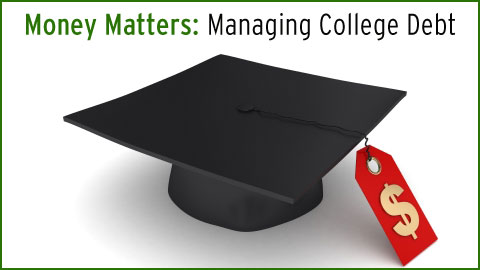Money Matters: Managing College Debt
Story by Peter “Coach Pete” D’Arruda, RFC, President of Capital Financial Advisory Group and the host of Coach Pete’s Financial Safari on WPTF, WEEB and WFNC.
The average college student today is almost certain to leave their university with student loan debt – in fact, they are more likely to leave with debt than they are to leave with a diploma.
Managing College Debt
This fact of life is particularly challenging in an economic environment like the one we are in today, where the promise of a job that rewards the expense of an education is not as great as it was for those that graduated a generation ago.
What Creates Student Debt?
Let’s face it: the factors that lead to indebtedness from the college experience goes beyond student loans. Late night pizza runs, weekend parties and spring break trips exacerbate the impact of student loans and credit card splurges that go hand-in-hand with today’s university experience. When you add tuition, books, and miscellaneous charges together after four (or more) years, college graduates are often staring at a number with a few too many zeros for their liking. While the price of higher education continues to climb, we need to be smart about how we finance our college years and ultimately pay them off.
Shop Around
The most important thing you can do is shop around for special low student rates on your loans before and after college. Deals are always popping up and it is worth your while to keep an eye out for them. If you can refinance at a lower rate at one point, do not add to the loan amount! Once you know exactly what your principal and interest are, you can set a structured plan of scheduled payments to get your loans paid off as soon as possible in a regimented fashion.
Debt Ratio
The key to paying off any debt, especially debt you accumulate early on in life, like in college, is keeping the amount you could borrow a lot higher than the amount you actually do borrow, known as your debt ratio. ‘Debtors prison’ is a term used to describe when individuals continue to borrow because ‘they can,’ then suddenly find themselves with a high debt ratio. All the while credit card companies start to lower the amount they will let you take on which severely hurts your credit score. Individuals who put themselves in “debtors’ prison” early on leave the rest of their financial life hanging in the balance. During the financial crisis we saw millions of individuals in ‘debtor prison’ due to excessive borrowing against their homes.
As often the case in life, knowing what not to do is just as important, if not more so, than knowing exactly what to do. In order to pay off college debt successfully and move on with your life, here are a few tips to make that transition as smooth as possible.
5 Ways NOT To Pay Off College Debt
- Do not use a credit card to pay off college loans, as you are taking a lower fixed rate and exchanging it for a short term lower VARIABLE rate. The variable rate could be up to 8 times more interest after the initial romance period is over.
- Never add student loans to other debts.
- Do not use home equity to pay it off.
- Do not pay off low interest student loans before other bills with higher interest rates.
- Do not stop contributing to your 401(k), if you have a match, to pay off your student loan early.
Listen to Coach Pete in the Triangle on Saturdays from 7 am to 8 am ET on 680 WPTF, 990 WEEB and 640 WFNC.



